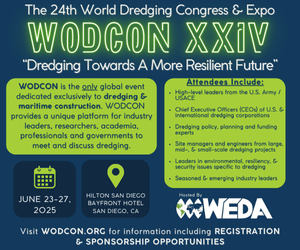CEDA Dredging Days, “Sustainable Dredging, Continued Benefits” held in Rotterdam, November 2017
With more than 200 delegates, speakers and exhibitors gathering at Ahoy Conference Center in Rotterdam, the Central Dredging Association (CEDA) Dredging Days conference and exhibition, held on November 9 to 10, continued its past successes. Held biennially in conjunction with Europort 2017, an exhibit for innovative maritime technologies and shipbuilding, CEDA Dredging Days always features top industry experts, engineers and research scientists from dredging contractors and academia as well as suppliers to the industry. The Central Dredging Association’s region comprises Africa, Europe and the Middle East, but the conference, first organized in 1980, drew people from all over the world, from 18 countries and 76 corporate and other organizations.
This year the two-day event focused on novel solutions and approaches to dredging projects that – besides fulfilling their primary function – minimized negative impacts on the natural and societal environment and in most cases also added value to nature, economy and society.
For those who arrived a day early, the papers, networking and exhibits were enhanced by a pre-conference technical visit, sponsored and organized the Jan De Nul Group, to the Princess Beatrix Lock. This is the largest inland waterway lock in the Netherlands, and after more than three-quarters of a century, it is in the process of being expanded. Other sponsors of the conference were the Antea Group, CableArm, Damen Dredging Equipment, DEME, the Port of Rotterdam, Royal IHC Shipbuilders, Wärtsilä, IPS, Royal HaskoningDHV and Svasek.

Keynotes and Papers
As described by Cees van Rhee, professor of dredging engineering at Delft University of Technology and chairman of the CEDA Dredging Days 2017 Technical Papers and Program Committee, the theme of “Sustainable Dredging – Continued Benefits” means “focusing on sustainable dredging with regard to both dredging activities and the resulting projects. Novel solutions that predict and measure the sediment release caused by dredging activities and examples of sustainable project development, such as the beneficial use of dredged sediment and the concept of Building with Nature.”
Next up was the keynote address by Frank Verhoeven, president of the International Association of Dredging Contractors (IADC), entitled, “The Dredging Industry’s Mindset.” Verhoeven gave insights into the most important developments that have influenced the private dredging industry to date and pointed out what he sees as the decisive drivers of the dredging market in the future. This was followed by a speech by Kathleen De Wit of IMDC, Belgium on behalf of CEDA’s Dredging Management Commission (DMC), on “CEDA’s checklist for successful dredging management.”
The centerpiece of the conference was the technical program featuring 20 peer-reviewed papers under four main categories: environment and monitoring, developments in instrumentation, sustainable working methods and equipment, and innovative solutions. This included dredging projects in both marine and freshwater environments. Day 1 also highlighted an Academic Session, which showcased state-of-the-art research papers on multiple subjects. In the best tradition of scientific research, these papers were often cooperatively written by mixed teams of specialists, hailing from different companies and countries working together.
The last presentation of the day came from Polite Laboyrie, chair of the editorial board, who introduced a new environmental book entitled, Dredging for Sustainable Infrastructure. A joint initiative of CEDA and the International Association of Dredging Companies, the book takes on the many issues surrounding the role of dredging in sustainable development and aims to become a standard guideline for the dredging industry. The expected publication date is in April 2018.
But the day was not yet quite over as a reception at the adjoining dredging exhibition was hosted by IPS, Svasek Hydraulics and Royal HaskoningDHV and gave attendees a chance to socialize and network. Throughout the conference, the exhibition floor with 13 company booths provided a meeting place for coffee and informal conversations.

Contractual Issues at the City of Loof
Day 2 saw an “interactive session” organized by the Dredging Management Commission, which focused on “contractual issues and how to avoid them.” The principle behind the theme is that “the dredging industry is facing ever-increasing risks and constraints as regards contracting, risk allocation, tightening margins and general contract and commercial management.” Using a theoretical case study set in “the city of Loof” where a large capital works operation is ongoing to deepen the River Tariwa at the harbor entrance to Distan Port, groups of participants, supported by a team of experts, explored issues, shared insights and discussed solutions relevant to important pressing and commercial aspects of delivering real-life dredging projects.

Young CEDA “Pitch Talks”
CEDA has long put an emphasis on attracting younger members and stimulating their participation. From CEDA’s perspective these younger professionals are the long-term life blood of the organization and the dredging industry. To that end, some of the younger members, who are part of what is known as “Young CEDA,” organized “pitch talks.” The pitch talks aim to provide students and young professionals with a platform to present their ongoing work, expose their ideas to an expert audience and get immediate feedback. At this conference, in an hour’s time, a series of seven short presentations were made pertinent to theme of the conference. In addition, 20 promising graduates and post-graduates were funded to attend the event as part of the Young CEDA Student Programme.
The formal part of the two-day forum concluded with the presentation of the IADC Young Author’s Award, which went to Jordy Boone, for his paper “1DH Modeling of Transport and Sedimentation Inside a Hopper of a Trailing Suction Dredger.”
CEDA’s many on-going regional activities and meetings will continue during the next two years until the entire group gathers again for the next Dredging Days in 2019.



